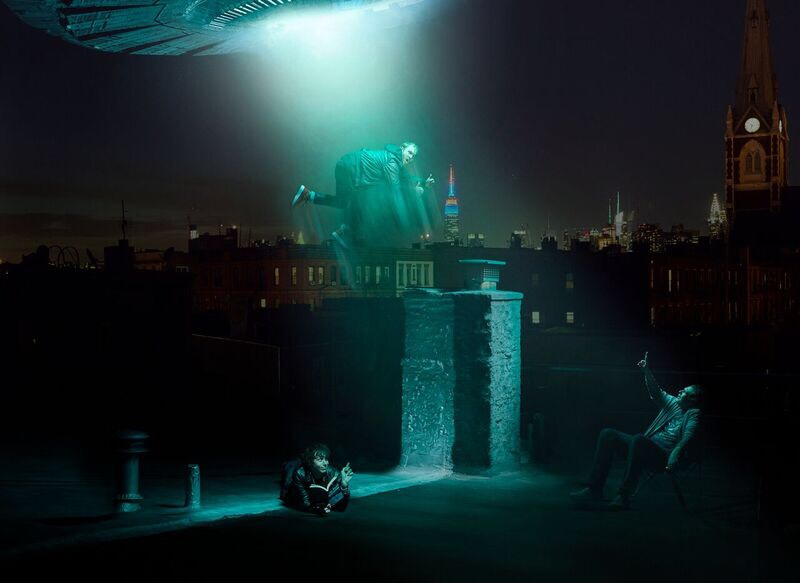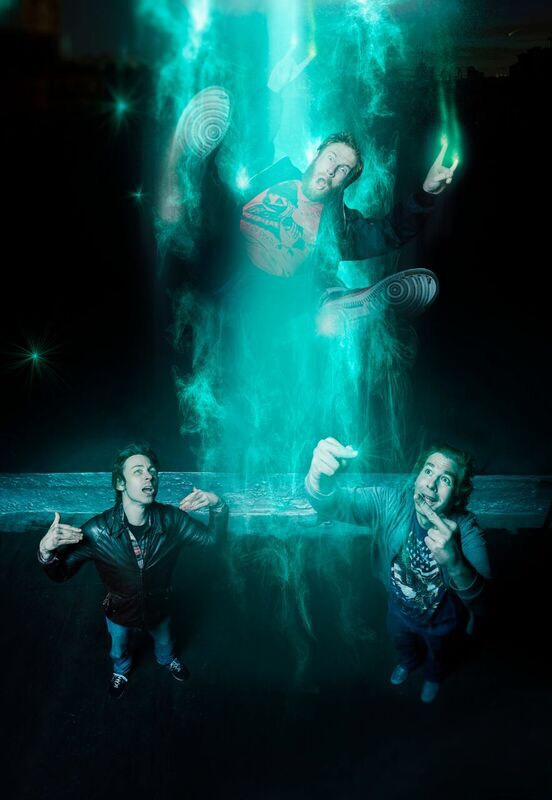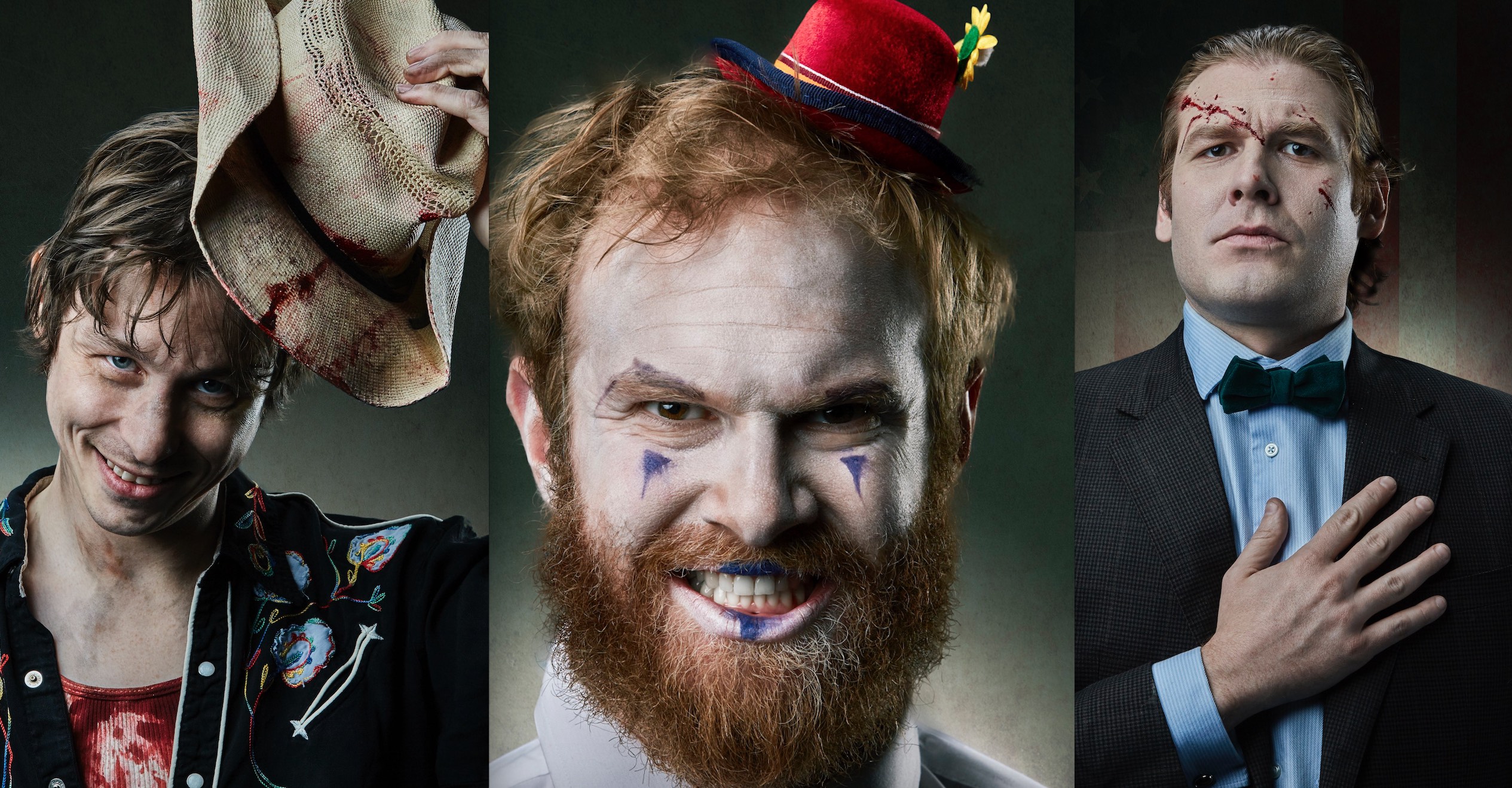It’s one thing when you and some buddies sit around and chat about serial killers and urban legends. But when comedians Ben Kissel, Marcus Parks, and Henry Zebrowski gather to discuss strange stuff like demonology, aliens, Satanism, mass murderers, boogeymen, the occult, and “all the horrors our world has to offer, both imagined and real,” it’s (relatively) serious business. Since 2011, these longtime friends have been the diabolical masterminds behind The Last Podcast on the Left, a lighthearted weekly exploration of the dark unknown.
“We were the first ones to ever do a true crime comedy show,” Kissel says. “Our friendship is based on a mutual love of strange things, and it works really organically.” Eight years ago, Kissel helped assemble an all-star team of podcasters, including himself, Jackie Zebrowski, Ed Larson, Holden McNeely, Marcus Parks, and the late Kevin Barnett, to record a show called The Roundtable of Gentlemen, where they discussed current events and strange stories from their own lives. Kissel and Parks discovered a shared passion for horror and launched a separate podcast (named after Wes Craven’s 1972 film The Last House on the Left) to discuss the scary stuff. Henry Zebrowski, who had been doing sketch comedy with Holden McNeely for over a decade, and who Parks had previously interviewed for a separate comedy podcast, joined Last Podcast after the second episode. “The show was never the same—in a good way,” recalls Kissel.
Four hundred episodes in and with an average of 2.5 million weekly listeners, the trio’s still going strong. In addition to winning the 2017 People’s Voice Webby Award for Podcasts & Digital Audio (Comedy) and continuing to record the hour-long podcast each week, there’s now an entire Last Podcast Network, an independently run association of podcasts, including the political program Abe Lincoln’s Top Hat (also hosted by Kissel and Parks), The Adventures of Danny and Mike (with Danny Tamberelli and Mike Maronna from ’90s cult hit The Adventures of Pete and Pete), and Wizard and the Bruiser (exploring nerd culture with hosts McNeely and Jake Young). There’s a new book in the works—The Last Book on the Left—and these days, Kissel, Parks, and Zebrowski are usually recording the podcast on the road, via live performances at different cities.
We caught up with Kissel and Zebrowski (Parks was busy researching future episode topics) just before they were about to hop on a plane for a half dozen shows in Australia.
What’s the origin of each of your passions for horror, the paranormal, and the bizarre?
Zebrowski: I would equate my love of horror with being raised Catholic. It kind of ended up twisting me, as it ends up twisting most people. But seriously, my mom was obsessed with horror and it kind of trickled down.
Kissel: I grew up in Wisconsin, so I always go back to Chris Farley and those days of SNL; I fell in love with that era of comedy. Then we had the true crime story of [Wisconsin-born] Jeffrey Dahmer and for some reason, those two things combined and really formed in my mind growing up, that sense of how strange and weird the world is. As far as a love for horror movies themselves go, there was always something cool about going to Hollywood Video or Family Video and having to walk past the porn section to get to the really good horror movies. They were so forbidden! I wasn’t interested in the porn, I just wanted to watch the most brutal horror flicks of all time.
What’s the planning process like for episodes of the podcast? Who decides each theme and how much preparation is needed in advance? Do you know whether a particular topic will be explored for a single podcast or more?
Zebrowski: We have a general idea of what’s coming up over a six-month period of time, which is how long we like to plan, especially when we’re traveling so we can schedule everything. We like to mix it up when it comes to longer and shorter series. Based on our own individual research about certain topics—like Bonnie and Clyde, which we’re in the middle of now—we first thought this was going to be two [episodes]. But then as soon as we start looking into the subject matter, it’s clear that this might become three episodes or longer because there’s so much information. Sometimes, Marcus and I will do pre-production in terms of selecting topics, and we’ll find that a subject isn’t actually as fulfilling as we hoped, so we’ll abandon it and find another one.
“I would equate my love of horror with being raised Catholic. It kind of ended up twisting me, as it ends up twisting most people.” — Henry Zebrowski
Kissel: Marcus and Henry do a great job of finding stories from all over the place. Henry is an alien and paranormal enthusiast—I mean, we all are, but Henry specifically is extremely down with alien stuff. We just had the chance to interview Dan Aykroyd for our Side Stories [series], which was absolutely a dream come true. So between our interests, we’re able to cover true crime serial killers, like Bonnie and Clyde, but also subjects that are esoteric and totally crazy and fun, like the Rendlesham alien tape that we just talked about recently.
Is it tricky to incorporate humor when discussing dark subjects like mass murder or torture?
Kissel: You do have to ride the line a bit. Throughout the years of recording the podcast, we’ve continuously been sort of honing this high-wire act that is true crime comedy. We never make fun of the victims, but we do openly poke fun at the monsters or incels or these moronic serial killers that truly are just pathetic loser slugs. We try to mock them as much as possible. Also, I think that if you’re searching for comedy in the world of true crime, it’s going to be dark. The idea that you’re going to be listening to a comedic show about serial killers and the paranormal and there’s not going to be blue humor? You’re mistaken. That being said, the thing about covering such R-rated subject matter is that it leaves room for a lot of really clean, PG jokes. Sometimes comedy performers want to be seen as hard or edgy but we don’t have to worry about having that intensity, because we’re already talking about horrible subjects to begin with.
 Which episodes or topics have been your favorite?
Which episodes or topics have been your favorite?
Zebrowski: The Men in Black episodes. I also love our history episodes more and more because Marcus is a huge history buff and he’s sort of infected me with it. I like true stories; as we get older and do [the podcast] longer, the serial killer stories have a tendency to blend together, so it becomes about trying to find out what’s really, really unique. We worked on a story recently about Joseph Kallinger, who had these protracted, insane psychological breakdowns that involved cutting penises off men so he could get more power to his own penis. It was fun to explore his mind for a while.
Kissel: Absolutely. The Kallinger story was interesting because we could really delve into his mental health issues as well as his horrific crimes, so I think he gave it a lot of depth. I love the long-form histories. When we covered the Donner party, there was so much information that was just out of this world that it’s like, holy hell, I can’t even believe it’s real.
You have a solid fanbase, which sometimes gets featured on the show, like when people offer listener stories. Because of Last Podcast’s subject matter, which broaches violent crimes and cold cases, do you ever get weirdos reaching out to you, or threats or things you have to report to authorities?
Zebrowski: The listenership is beautiful because of how many different people listen, from soccer moms to heavy metal dudes—it’s a really good cross-section. I honestly have heard way more creepy shit about just what normal female comedians have received from fans than what we have. Part of what we do is normalize interest in these subject matters, so people feel like they can comfortably talk with us. I don’t know what the barometer for “weird” is anymore. When it comes to gifts, I’ve received vials of human blood. We’ve gotten people’s ashes.
“We never make fun of the victims, but we do openly poke fun at the monsters or incels or these moronic serial killers that truly are just pathetic loser slugs.” — Ben Kissel
Kissel: Yeah, one listener gave us his father’s ashes. We actually have some of the sweetest fans, they’re amazing. We’ve had a couple of times when people went, “I’m gonna get on your show!” We always say that the only way we’ll cover someone on the podcast is if they find an alien. Then they’ll be a topic. Because we talk about a lot of violent acts, and we always, always reiterate that if anyone wants to get on this show, don’t ever do anything violent. Just find us an alien.
Tell me about Last Podcast’s live performances. With your respective backgrounds in theater, stand-up comedy, and film and television, what are your road shows like?
Zebrowski: It’s much closer to a three-person stand-up show than anything else. I know some live shows which involve just sitting and recording a podcast—which works for some people, but not us. We’re a higher energy show. Some people travel for hours to come see us, so we want to make sure that if you show up, you’re getting a tight program that we’ve workshopped ahead of time. We’ll rehearse and test topics and scrap what doesn’t work, so by the time we go live, it’ll be something like our fourth or fifth show. We take it really seriously.
Kissel: Henry was in sketch comedy and I did stand-up, so being able to perform in a theater and have a cheering crowd is a total dream come true. I think our live shows are some of the best traveling podcasts you can attend. It’s great to meet everyone. In this medium, we’re always just in people’s ears, but they develop such a close connection with us that when we meet them, they start telling us stories about their lives and passions, and it’s great to have that personal connection.
 What can you reveal about the upcoming Last Book on the Left?
What can you reveal about the upcoming Last Book on the Left?
Zebrowski: We’re adding our voice to the world of serial killer books, which we thought was important because we’ve been telling these stories for a long time. There have been many other resources that we’ve drawn from, but we’re putting our own spin on it, partly from our interpretation of facts about cases and the way we view topics; this is the culmination of about two years of research. Another thing we learned, through this process, was how very, very, very difficult it is to write a book.
“When it comes to gifts, I’ve received vials of human blood. We’ve gotten people’s ashes.” — Zebrowski
Kissel: It’s definitely been a labor of love. Marcus has dedicated so much time to writing the bulk of the chapters, while Henry works closely with our out-of-this-world talented illustrator Tom Neely. The book is going to be fun. Full of information, full of jokes, and full of badass art that elevates it to the next level. It’ll be out February next year, then we’ll go on a book tour. I usually need immediate feedback, like applause and laughter, as soon as I say something funny. Marcus has seriously been busting his ass to make this book happen, and I can’t wait for him to hear all the rave reviews that I know people are going to give.
After eight years recording the podcast, is there anything you’d like to share with listeners that they may not know about the three of you or your process?
Zebrowski: I think it’s important for people to know that we’ve been doing this for no parent company. We organized the entire thing ourselves, with three employees, and that’s it. You don’t necessarily need a “yes” from a big company to make something for yourself: you can make something for yourselves and still be successful.
Kissel: We’re all just middle-class kids. Marcus grew up on a ranch literally in the middle of nowhere in Texas. Henry’s old man was a cop, mine was a truck driver—so the fact that we can do this is a tribute to being able to do something with your friends that you love. FL







